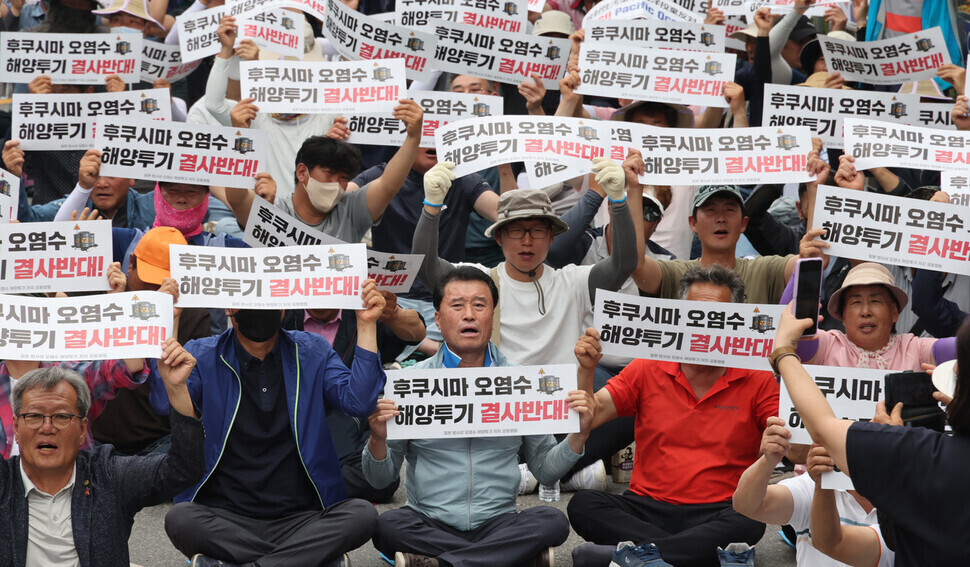hankyoreh
Links to other country sites 다른 나라 사이트 링크
Japan’s lack of transparency on Fukushima water is sparking fear in neighbors, says Japanese expert

The reason South Korea, China, and other countries are concerned about the safety of Japan’s imminent release of contaminated water currently being stored at the Fukushima Daiichi nuclear plant into the ocean is the result of Tokyo’s failure to provide adequate information, an expert claimed in a recent interview.
Naoya Sekiya, an associate professor at the University of Tokyo, said in an interview published Friday by the Asahi Shimbun newspaper that the “anxieties of people in South Korea, China, and other neighboring countries have not been resolved” in connection with the water’s release.
He also said a “big factor in this issue” was “the Japanese government not providing adequate information.”
While South Korean President Yoon Suk-yeol and his ruling People Power Party have been dismissing the public’s fears as based on “hoaxes,” Sekiya’s remarks show even Japanese experts are commenting on Tokyo’s failure to supply enough information.
In 2017 and 2022, Sekiya conducted surveys of 3,000 residents in 10 countries — including South Korea, China and Taiwan — to ask about their perceptions of the Fukushima nuclear disaster in March 2011.
In a survey conducted last year — 11 years after the disaster — around 60% of respondents in South Korea still said they were concerned about the safety of their own country’s seafood products due to the impact of radioactive material from Fukushima. Around 50% of Chinese respondents gave the same response.
The surveys also showed 80% of South Korean respondents and 60% of Chinese respondents expressing concerns about seafood from the Fukushima region.
“To date, they have failed to dispel perceptions in South Korea, China, and other neighboring countries that Fukushima and even their own territories have been contaminated as a result of the nuclear power plant disaster [in March 2011],” Sekiya explained.
Under the circumstances, the Japanese government’s claims that it is safe to release the treated water are unlikely to be accepted, he added. In other words, people are only going to feel more apprehensive about the safety of the water’s release when they are already nervous about radioactivity.
When asked when neighboring countries were politically exploiting the contaminated water issue, Sekiya said there were some practical differences.
“The Japanese government has determined that governments in neighboring countries have been using [the water’s release] as a political issue with things like critical statements by the Chinese government and the South Korean government’s consideration of whether to lodge a case with the International Tribunal for the Law of the Sea,” he observed.
But in reality, he added, residents of China and South Korea are “nervous about the treated water.”
“While the Yoon Suk-yeol administration has shown a different response on the treated water issue, including its decision to send an inspection team to Fukushima, the [South Korean] public’s anxieties haven’t gone away, and the problem hasn’t been resolved,” he noted.
With its focus so far on resolving issues related to the water’s release by means of international organizations like the International Atomic Energy Agency (IAEA), the Japanese government has failed to provide adequate explanations or make information public to neighboring countries.
Sekiya said, “The Japanese government has commissioned the IAEA to conduct an examination and shared information through active cooperation with international organizations like the International Commission on Radiological Protection and Organisation for Economic Co-operation and Development.”
“The ones they should have been sharing information more actively with are Japan’s neighbors, where people have been feeling very frightened,” he suggested.
By Kim So-youn, Tokyo correspondent
Please direct questions or comments to [english@hani.co.kr]

Editorial・opinion
![[Column] Welcome to the president’s pity party [Column] Welcome to the president’s pity party](https://flexible.img.hani.co.kr/flexible/normal/500/300/imgdb/original/2024/0515/3917157400447943.jpg) [Column] Welcome to the president’s pity party
[Column] Welcome to the president’s pity party![[Editorial] Korea must respond firmly to Japan’s attempt to usurp Line [Editorial] Korea must respond firmly to Japan’s attempt to usurp Line](https://flexible.img.hani.co.kr/flexible/normal/500/300/imgdb/original/2024/0514/2317156736305813.jpg) [Editorial] Korea must respond firmly to Japan’s attempt to usurp Line
[Editorial] Korea must respond firmly to Japan’s attempt to usurp Line- [Editorial] Transfers of prosecutors investigating Korea’s first lady send chilling message
- [Column] Will Seoul’s ties with Moscow really recover on their own?
- [Column] Samsung’s ‘lost decade’ and Lee Jae-yong’s mismatched chopsticks
- [Correspondent’s column] The real reason the US is worried about Chinese ‘overcapacity’
- [Editorial] Yoon’s gesture at communication only highlights his reluctance to change
- [Editorial] Perilous stakes of Trump’s rhetoric around US troop pullout from Korea
- [Guest essay] Preventing Korean Peninsula from becoming front line of new cold war
- [Column] The state is back — but is it in business?
Most viewed articles
- 1[Column] Welcome to the president’s pity party
- 2Could Korea’s Naver lose control of Line to Japan?
- 3[Editorial] Transfers of prosecutors investigating Korea’s first lady send chilling message
- 4[Editorial] Korea must respond firmly to Japan’s attempt to usurp Line
- 5Naver’s union calls for action from government over possible Japanese buyout of Line
- 6Major personnel shuffle reassigns prosecutors leading investigations into Korea’s first lady
- 7US has always pulled troops from Korea unilaterally — is Yoon prepared for it to happen again?
- 8[Column] Will Seoul’s ties with Moscow really recover on their own?
- 9[Correspondent’s column] The real reason the US is worried about Chinese ‘overcapacity’
- 10[Column] Samsung’s ‘lost decade’ and Lee Jae-yong’s mismatched chopsticks